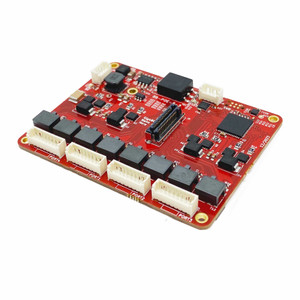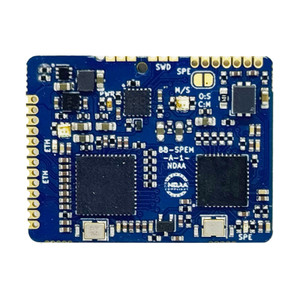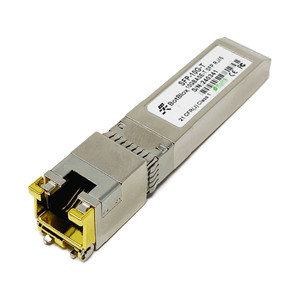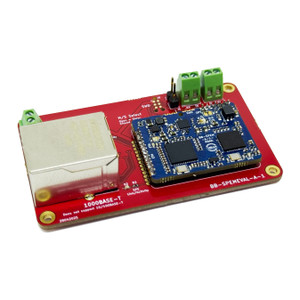
Power over Ethernet, finally made easy
Power over Ethernet (PoE) allows ethernet wiring to be used to deliver power as well as data, thus eliminating the need for additional power wiring. This has huge potential for reducing cabling and complexity in mobile, size, weight and power (SWaP) limited platforms.
The problem is that PoE is inconsistently applied across third party hardware, leaving system integrators confused and struggling to actually use the technology.
We designed the Universal PoE Module to finally solve this issue. It is a PoE injector that supports all types of PoE simultaneously, from passive PoE for legacy devices, all the way up to 90W PoE (IEEE 802.3bt, Type 4), and everything in between!
This module finally delivers a universal solution, supporting all PoE types up to 84W.
Ridiculously small, ridiculously rugged, and embeddable
At 28mm x 28mm x 11mm, PoE Module is the smallest solution on the market, while still achieving a -40°C to 85°C operating range. We use rugged, positive locking connectors (Molex PicoBlade) for vibration tolerance, along with two M2 mount holes for easy mounting. By design, this module is meant to be flown, driven, vibrated, frozen, heated, and still provide a stable PoE output and ethernet data connection.
NDAA Compliant
As one of our newer products, PoE Module will be fully NDAA compliant, with a supply chain based entirely outside of China.
Passive (non-standard) vs Active (standard) PoE
PoE Module supports the following Active (standard) PoE versions.
| PoE Name | IEEE Standard | Maximum power output per port |
| PoE | IEEE 802.3af | 15.4W, 2 pair |
| PoE+ | IEEE 802.3at | 30W, 2 pair |
| PoE++ | IEEE 802.3bt (Type 3) | 60W, 4 pair |
| PoE++ | IEEE 802.3bt (Type 4) | 84W (Max), 4 pair |
Many older and cheaper devices (specifically many low cost cameras) say they support PoE, where actually they simply require voltage to be passively injected directly onto the ethernet lines. This type of PoE is non-standard. PoE Module can support this by soldering two solder jumpers on the board.
Future management
PoE Module contains an onboard microcontroller and UART port to allow for future serial control of the PoE port. Currently this software is unimplemented.
Technical Specifications
| Voltage input (Active PoE) | 48 - 60V |
| Voltage input (Passive PoE) | 0 - 65V |
| Maximum input voltage | 70V |
| Dimensions | 30mm x 30mm x 11mm |
| Operating Temperature | -40°C to 85°C |
| Ethernet speeds supported | 10BASE-T, 100BASE-T, 1GBASE-T |
| Number of ports | 1 upstream port, 1 downstream port |
| PoE versions supported | IEEE 802.3af, IEEE 802.3at, IEEE 802.3bt (Type 3), IEEE 802.3bt (Type 4) |
| NDAA Compliant? | Yes |
Availability
PoE Module is currently in development, please get in touch if you are interested in getting this hardware.
| Revision | Subrevision | Part number | Release Date | Notes |
|---|
Power over Ethernet, finally made easy
Power over Ethernet (PoE) allows ethernet wiring to be used to deliver power as well as data, thus eliminating the need for additional power wiring. This has huge potential for reducing cabling and complexity in mobile, size, weight and power (SWaP) limited platforms.
The problem is that PoE is inconsistently applied across third party hardware, leaving system integrators confused and struggling to actually use the technology.
We designed the Universal PoE Module to finally solve this issue. It is a PoE injector that supports all types of PoE simultaneously, from passive PoE for legacy devices, all the way up to 90W PoE (IEEE 802.3bt, Type 4), and everything in between!
This module finally delivers a universal solution, supporting all PoE types up to 84W.
Ridiculously small, ridiculously rugged, and embeddable
At 28mm x 28mm x 11mm, PoE Module is the smallest solution on the market, while still achieving a -40°C to 85°C operating range. We use rugged, positive locking connectors (Molex PicoBlade) for vibration tolerance, along with two M2 mount holes for easy mounting. By design, this module is meant to be flown, driven, vibrated, frozen, heated, and still provide a stable PoE output and ethernet data connection.
NDAA Compliant
As one of our newer products, PoE Module will be fully NDAA compliant, with a supply chain based entirely outside of China.
Passive (non-standard) vs Active (standard) PoE
PoE Module supports the following Active (standard) PoE versions.
| PoE Name | IEEE Standard | Maximum power output per port |
| PoE | IEEE 802.3af | 15.4W, 2 pair |
| PoE+ | IEEE 802.3at | 30W, 2 pair |
| PoE++ | IEEE 802.3bt (Type 3) | 60W, 4 pair |
| PoE++ | IEEE 802.3bt (Type 4) | 84W (Max), 4 pair |
Many older and cheaper devices (specifically many low cost cameras) say they support PoE, where actually they simply require voltage to be passively injected directly onto the ethernet lines. This type of PoE is non-standard. PoE Module can support this by soldering two solder jumpers on the board.
Future management
PoE Module contains an onboard microcontroller and UART port to allow for future serial control of the PoE port. Currently this software is unimplemented.
Technical Specifications
| Voltage input (Active PoE) | 48 - 60V |
| Voltage input (Passive PoE) | 0 - 65V |
| Maximum input voltage | 70V |
| Dimensions | 30mm x 30mm x 11mm |
| Operating Temperature | -40°C to 85°C |
| Ethernet speeds supported | 10BASE-T, 100BASE-T, 1GBASE-T |
| Number of ports | 1 upstream port, 1 downstream port |
| PoE versions supported | IEEE 802.3af, IEEE 802.3at, IEEE 802.3bt (Type 3), IEEE 802.3bt (Type 4) |
| NDAA Compliant? | Yes |
Availability
PoE Module is currently in development, please get in touch if you are interested in getting this hardware.
| Revision | Subrevision | Part number | Release Date | Notes |
|---|







